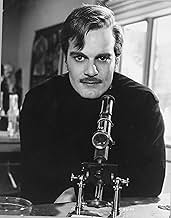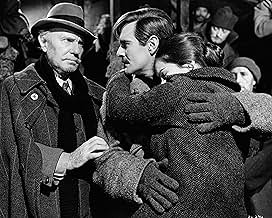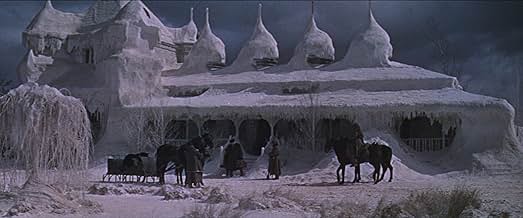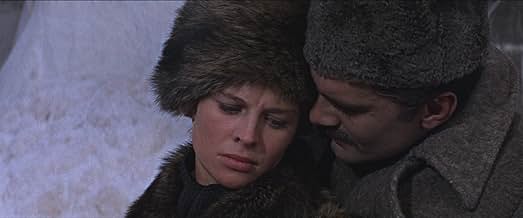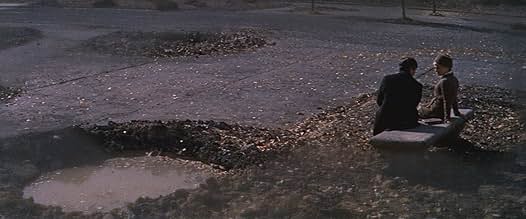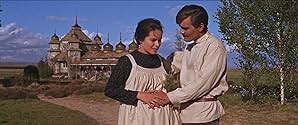Film sulla vita di un medico e poeta russo che, sebbene sposato, si innamora della moglie di un attivista politico, e sulle avversità da lui affrontate durante la Prima guerra mondiale e la ... Leggi tuttoFilm sulla vita di un medico e poeta russo che, sebbene sposato, si innamora della moglie di un attivista politico, e sulle avversità da lui affrontate durante la Prima guerra mondiale e la Rivoluzione d'ottobre.Film sulla vita di un medico e poeta russo che, sebbene sposato, si innamora della moglie di un attivista politico, e sulle avversità da lui affrontate durante la Prima guerra mondiale e la Rivoluzione d'ottobre.
- Regia
- Sceneggiatura
- Star
- Vincitore di 5 Oscar
- 21 vittorie e 13 candidature totali
- Liberius
- (as Gerard Tichy)
Riepilogo
Recensioni in evidenza
I also think that you should see this on the big screen back to back with Warren Beatty's Reds. Two very opposite views of the Russian Revolution, one from the inside and one from the outside. You could have a very interesting discussion on which is which.
The title character, played by Omar Sharif, is Dr. Yuri Zhivago who is both doctor and poet. He was orphaned as a child and raised in the house of Ralph Richardson and Siobhan McKenna. He marries their daughter, Geraldine Chaplin who of course he loves, but naturally like a sister.
The real passion of his life is Julie Christie who is married to a committed Bolshevik in Tom Courtenay. Courtenay is also a guy, with shall we say, some issues. She loves him in her own way though and goes to search for him when he volunteers for the army to subvert it as the Bolshevik plan was when Russia entered World War I.
Christie meets Sharif at the front and the passion ignites. But all around them the society they knew and were brought up in is crumbling about them. Their story set against the background of the Russian Revolution is what Doctor Zhivago is all about.
Zhivago knows change was inevitable, the old order in Russia was ready to be toppled. But he's a poet and not one to let his art be subverted for the sake of the state. Fortunately he's also a doctor and his services are needed, in fact the Bolsheviks rather brutally insist on his accompanying one of their brigades as a medical officer.
I still remember as a lad the acclaim Boris Pasternak's novel got world wide when it was published while being banned in his home land. After winning the Nobel Prize for Literature, Pasternak died shortly thereafter. It's a pity he did not live to see this film, I think he would have approved.
From the deserts of Arabia to the steppes of Russia, David Lean certainly knew how to direct a film that involved vastness. Yet the people of his stories be it Lawrence of Arabia or Doctor Zhivago never get lost in the spectacle. Lean makes you care about the characters that Pasternak created, you get involved in the romance of Sharif and Christie, you want to know if they'll make it in this country undergoing revolutionary convulsions.
Other performances of note are Alec Guinness as Sharif's half brother Yevgeny Zhivago, a committed Bolshevik himself and Rod Steiger as the opportunistic Komorovsky.
Doctor Zhivago won a host of awards in several technical categories, strangely enough it wasn't nominated for Best Picture in 1965 though. It is a classic and even now with the Soviet Union a memory, I doubt if even a Russian made remake of Zhivago could equal what David Lean and his wonderful cast gave us in 1965.
"Doctor Zhivago" is definitely one of his most outstanding works, a film that breathes with life, and suffers with passion. Neither, though, of the credited people can take as much credit for it, as David Lean. Omar Sharif delivers one of his best performances of his career, Julie Christie has never been as stunning, or Rod Steiger as Komarovsky or Tom Courtenay as Antipov ever left more memorable performances than these ones. Not even Maurice Jarre, who composed one of the most unforgettable themes in film history, or Robert Bolt, for his skillful adaptation on Pasternak's difficult novel, not even Freddy Young's cinematography, can rise above the vibration of genius, which is David Lean. We almost feel the complexity of the universe collapsing on us with a mad power that we instantly become part of it, and fall in love with all its particles.
For those who haven't seen the film, this might make little sense, and it can give a misleading understanding of what one is to expect. "Doctor Zhivago" is a poet, who at the beginning of the 20th Century is caught in the historical Bolshevik revolution. An outstanding doctor, married to his childhood friend, Tonya (Geraldine Chaplin in a warm performance), finds that there is beauty beyond deceit, love beyond commitment, by starting an affair with an enigmatic lady which appears often in his path in the most unnoticeable of moments. Their destiny is as confused as Russia in the turmoil started by the Reds, it is shaped by history without their approval. There is no solution for a country that abandoned its passions in its desire of self-improvement, just as for the two lovers, which find themselves abandoned in the middle of the Siberian taiga.
This is a slow film and for the good reasons. We are allowed to breathe the story, to give it momentum, and to judge it from within, as if the choices were not Yury's, Lara's or Tonya's, but our own creation. And this is the brilliance of Lean's direction. The story transcends time and space, and it melts within the triviality of our life. Beyond it, we are left with nothing but love, pure and blindingly real.
"Doctor Zhivago" certainly pulled off a coup by showing the conditions that led to the revolution: the czar's despotic rule, the crushing poverty, and forced conscription (especially since the generals cared nothing about the men under their command). Then, of course, the Russian people thought that they would have a workers' society, but it didn't turn out that way. The theme song "Lara's Theme" kept the movie going every step of the way. Maybe not the greatest historical drama of all time, but this is a movie that I recommend to everyone.
Lo sapevi?
- QuizThis movie wasn't shown in Russia until 1994.
- BlooperThe little girl who plays Tonya at Yuri's mother's funeral starts to cross herself in the Roman Catholic manner, but quickly corrects herself and finishes in the Russian Orthodox style.
- Citazioni
Komarovski: Lara, I am determined to save you from a dreadful error. There are two kinds of men, and only two, and that young man is one kind. He is high-minded. He is pure. He is the kind of man that the world pretends to look up to and in fact despises. He is the kind of man who breeds unhappiness; particularly in women. Now, do you understand?
Lara: No.
Komarovski: I think you do. There's another kind. Not high-minded. Not pure. But alive. Now that your taste at this time should incline towards the juvenile is understandable. But for you to marry that boy would be a disaster. Because there's two kinds of women...
[Lara covers her ears, he forces her arms down]
Komarovski: There are two kinds of women and you - as we well know - are not the first kind.
[Lara slaps him, he slaps her back]
Komarovski: You, my dear, are a slut.
Lara: I am not!
Komarovski: We'll see.
- Versioni alternativeWhen it was first released, the film originally ran 197 minutes. Early in its run, David Lean and editor Norman Savage shortened it to 180 minutes; this version was in circulation for years. By the mid-1990s, the uncut version was restored.
- ConnessioniEdited into Hollywood: The Dream Factory (1972)
I più visti
Dettagli
- Data di uscita
- Paesi di origine
- Sito ufficiale
- Lingue
- Celebre anche come
- Doctor Zhivago
- Luoghi delle riprese
- Morley Flats, Alberta, Canada(Frozen house longshots)
- Aziende produttrici
- Vedi altri crediti dell’azienda su IMDbPro
Botteghino
- Budget
- 11.000.000 USD (previsto)
- Lordo Stati Uniti e Canada
- 111.721.910 USD
- Lordo in tutto il mondo
- 112.090.394 USD
- Tempo di esecuzione
- 3h 17min(197 min)
- Colore
- Proporzioni
- 2.35 : 1







